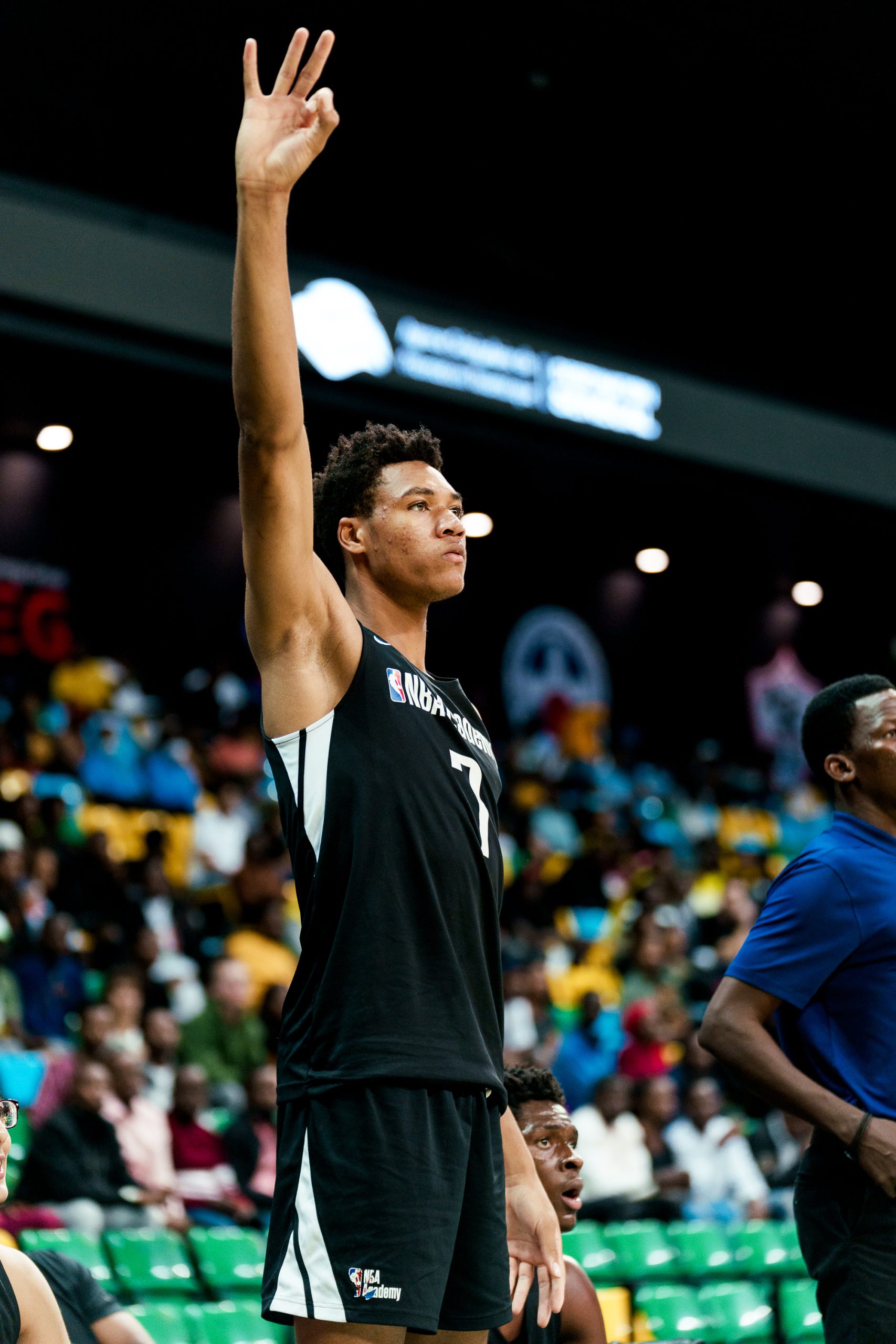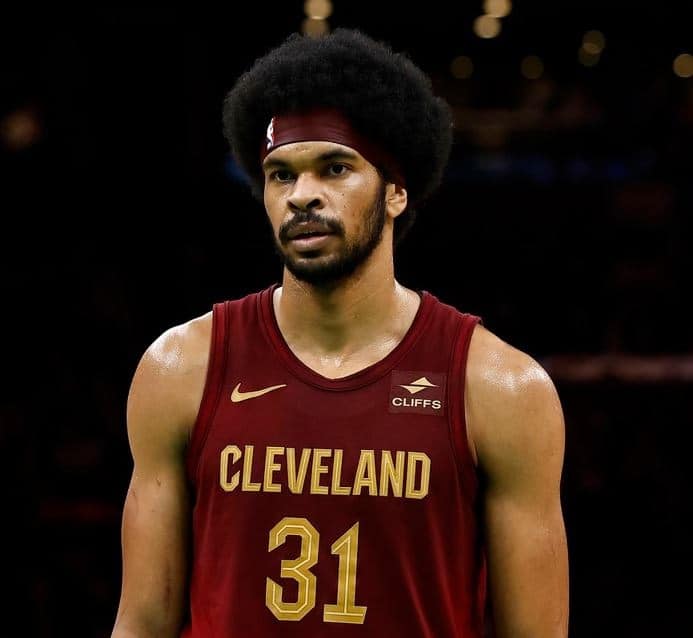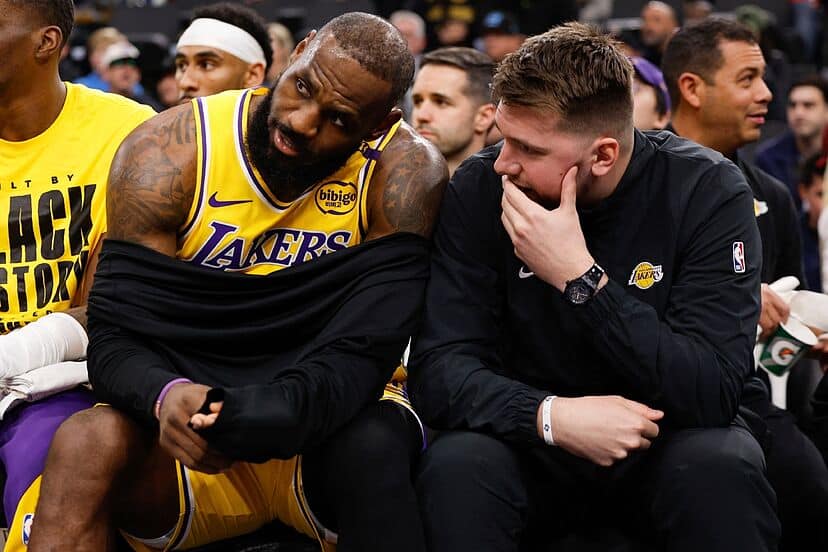Ulrich Chomche had never left Bafang, the remote village in the West region of Cameroon that he called home. He was 13 years old and had just recently picked up basketball. By his own admission, he wasn’t any good. Not yet. But he was 6-7 and suddenly faced with the opportunity to take his game to another level—to untap his full potential. Only he would have to leave Bafang and move thousands of miles away to do it.
NBA Academy Africa, an elite basketball training center in Saly, Senegal, had been founded in 2017, roughly a year before one of its coaches, Joe Touomou, began recruiting Chomche. At first, the answer was no. Chomche’s parents had been reluctant to let him play basketball in the first place, so this was out of the question. “My parents didn’t want me to do any activities except school because my family values education a lot,” Chomche tells SLAM. In order to join the local team, he had struck a deal with them: Chomche could play, but if his grades suffered at all, he would have to quit.
So far, Chomche had not slipped up. But this was a much bigger ask. Basketball was new to the Chomche family. None of Ulrich’s 16 siblings played, instead gravitating to soccer, by far the most popular sport in Cameroon. Ulrich grew up helping out on the family farm—not dreaming of a future in the NBA.
Initially rejected, Touomou returned to Cameroon to meet with Chomche’s parents again. He outlined just how much the Academy could benefit Ulrich, both on and off the court. Not only would he work with topnotch coaches to improve as a basketball player—he would also receive a first-rate education and have the chance to travel the world with his new classmates. This time, Touomou was able to convince them.
Not long after, the kid from Bafang arrived at the impressive campus in Saly. Everything had changed in a blink. Chomche was shy, quiet and surrounded by strangers, many of whom he struggled to communicate with. Courses were taught in English—a language that the French-speaking Chomche didn’t know. He was set up with a tutor, while also adjusting to a strict new basketball regimen. At his size with his agility, Chomche certainly had the tools to become a dominant big man. But he was still learning the basics of the game.
“When Ulrich came, he did not know basketball,” says Franck Traore, Head of Basketball Operations for NBA Africa. “He could move [well], we evaluated him properly, and the coaching staff at the Academy obviously worked with him every day. We believed in him.”
Chomche’s team back in Bafang had practiced just a few times per week; at the Academy, he was practicing multiple times per day. He trained with experienced basketball minds like Touomou, who played four seasons at Georgetown University (1995-99), served as an international scout for the Indiana Pacers and is a longtime camp director at Basketball Without Borders Africa (where he coached NBA stars Joel Embiid and Pascal Siakam).
“What really [made Chomche] take off was the mentorship piece,” Traore explains. “He needed that. As soon as we had that in place, his mindset shifted. He believed in himself—that he could do it. And his game took off.”
From the beginning, Chomche displayed an incredible work ethic. His current schedule at the Academy sees him report to the gym around 5:30 am every day for an individual workout, followed by a team practice and an hour of weightlifting—all before morning classes start at 10:00 am. For a while, Chomche was also taking night classes (after a second team practice from 5:30-7:30 pm) so that he could graduate early (which he did).
“What I like about the Academy is that they don’t only teach you how to play basketball, they teach you how to be a man, too,” Chomche says.

Every time he took the floor—whether it was in practice, a global exhibition game, the Basketball Africa League, or a premier scouting event—Chomche looked less lost and more confident. Less clumsy and more polished. Over the past five years, he has matured from a complete novice to one of the most promising international prospects.
Last week, Chomche, who now stands 6-11 with a 7-4 wingspan, officially entered his name in the 2024 NBA Draft. He is expected to become the first NBA Academy Africa graduate to be picked. Given the rise of basketball across the continent, there will be many more to come. Chomche’s close friend Khaman Maluach, a 7-2 center from South Sudan headed to Duke in the fall, is projected to be a top-three pick in 2025. The two proudly represented the Academy in the recent Nike Hoop Summit, an annual high school showcase held in Portland, OR.
“It’s a good thing that I have my brother with me because every time we practice in the Academy, we say we are preparing for a war,” Chomche says of Maluach. “Every time we practice, we are competing. And I’m very grateful to have him with me because he helps push me every time.”
Together they have been a dynamic duo for the Academy, often carrying the team. In December, they led their squad to two impressive victories at the G League Winter Showcase, starring in front of hundreds of NBA executives and scouts. Chomche flashed what makes him such a special prospect: mainly, his defensive versatility. He possesses both the athleticism to protect the rim and the mobility to switch onto guards on the perimeter. At the 2022 Basketball Without Borders camp in Cairo, Egypt, Chomche won the Defensive MVP award.
“His biggest strength is defense,” Traore says. “First of all, his size and length—you cannot teach that. He was born with it. It’s a gift. Great rebounder. Great shot blocker. The timing is exceptional. And his lateral movement, being able to defend, that’s already a gift for him. I think that’s half the battle for him. He’s adding a nice three-pointer. He can shoot from the corner and make them consistently. During the games, when we need it, he’s able to make those shots.”
Chomche is still developing his offensive game and will need time to adapt to the NBA. He’s just 18 years old—the youngest player eligible for the 2024 Draft. Training at the Academy over the next few months, Chomche is focused on improving his ball-handling, shooting and finishing around the basket. He has shown signs of being able to spread the floor—during Basketball Africa League qualifiers in November, he shot 38 percent from behind the arc (8/21), while also averaging 13 points, 9 rebounds and 2.7 blocks.
Marshall Cho, who coached Chomche at the Nike Hoop Summit, says the Cameroonian center has “some of the most elite feet for a guy that size.” Cho points to Chomche’s help defense and screen-setting as evidence. “Those are two things that he can do that don’t require shooting,” Cho stresses. “So all the criticism of his touch around the rim or whatever it may be—that he’s raw—he has a base that the League needs right now. Beyond that, if you’ve seen him shoot the three, he can actually really shoot it. He has that in him.”
Above all else, Chomche is “a winner,” says Traore. He does the little things and always finds a way to make an impact, even if it doesn’t show up in the box score. “I would be surprised if Ulrich went his entire career in the NBA without a championship,” Traore continues. “Having some of the best coaches in the world work with him every day, Ulrich will be a starter in the NBA for over a decade. That’s who he is.”
Regardless of what the future holds, Chomche is already one of the Academy’s best success stories. How far he’s come since joining the program is validation that the initiative is working—that leaving Bafang was definitely worth it.
“He comes from a very humble background,” adds Traore. “He’s representing his family very, very well.”
Photos via Getty Images.






